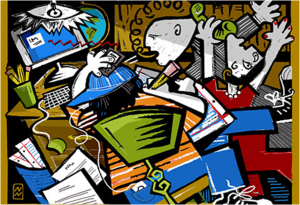
Being told to ‘Focus!’ is an external cue which tells us that someone else has noticed we are not fully engaged. Hearing those words however, does not magically restore our focus, but it does offer a gentle reminder to ‘come back’ to the conversation. When you hear that cue, take notice of what it is that was stealing your attention — was it the lawn mower outside your window, the sudden outburst of a co-worker or classmate, your empty stomach growling?
Awareness is the first step toward making a change in behavior. Window seat derailing you with too many distractions? Sit with your back to it, choose another seat or physically move your chair to avoid the distractions. DONE. Hunger pangs? Reach into that small Ziploc of almonds in your pocket. DONE. Loud surroundings? Headphones with low music (or none!) can be your white noise. DONE.
For students, approach the teacher outside of class and let them know you attend better when you are — fill in the blanks — sitting in the first row, doodling/taking notes, standing in the back of the classroom, etc. For working adults, speak privately with the boss about optimizing your work environment, such as moving to an office at the end of the hallway away from coffee station traffic, closing the door for quiet work time, sitting close to the phone during conference calls. Sometimes a tiny tweak can make a big difference in your attention.
Many people with ADD have a ‘sidebar activity’. The sidebar is a secondary activity which is done simultaneously with the main activity, and whose primary function is to engage some aspect of body or mind in order to ‘free-up’ attention to important tasks. Doing their ‘sidebar’ allows people to focus better on the task at hand. Sidebars are as varied as their owners — doodling, listening to music, standing or pacing, chewing gum, fiddling with jewelry, humming softly – whatever yours is, it must be relatively unobtrusive to be acceptable to those around you. Your job is to figure out what your sidebar is and let your coworkers/boss/teacher know. This allows them to have a better understanding of how you work best, and they will be more willing and likely to accommodate you.
If you need to move around, how about wiggling your toes inside your shoes? No one will know you are doing so, and this harmless movement may be just enough to get your mind back on track. Interrupting the speaker or blurting out responses? Try writing that thought down in a small notebook, or raising your hand to contribute respectfully, or punch it into an app like Evernote on your smartphone, instead, to be contributed at the appropriate time.
In the workplace, a good option is to take notes in a business meeting just to stay alert and focused. The listening and writing allows multi-sensory engagement which also improves memory! Another added bonus of this practice is that others perceive you as being especially interested in what they are saying! Students, the teachers will see you taking notes and credit you for active listening. Employers will notice the engaged employee.
I once coached a college student client who sat in a yoga pose in the back of a classroom (unobtrusively). Her yoga sidebar allowed her mind to focus more acutely on the lecture while her body quietly attended to the muscular demands of the pose. An adult client handled a smooth ‘rubbing stone’ in his left hand while doing repetitive paperwork with the other. Many people like to squeeze the widely available ‘stress balls’, with the added benefit of strengthening the wrist and hand! Others wear a wristwatch with a barely audible ticking sound whose cadence sets a rhythm to work by. Put your creativity to work and imagine the myriad possibilities for your sidebars.
Once you know how you learn or work best, you can discover and practice your own sidebar activities that help hone your attention and improve your focus! Armed with this insight, you can begin to ask others to accommodate your needs. Many teachers and bosses will respect your self-awareness and try to accommodate you once they know what works best for you. They want you to succeed, especially if you show that you are taking steps to improve your performance. Self-awareness goes a long way and will help you overcome challenges with focus. Take some time to discover what works for you and let others know. What’s your sidebar?